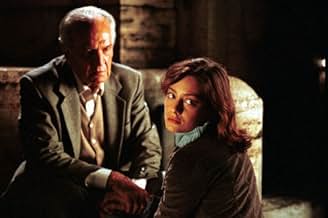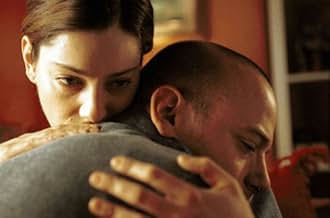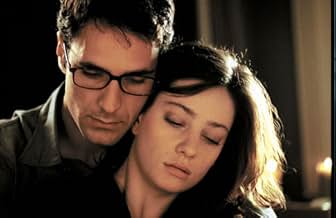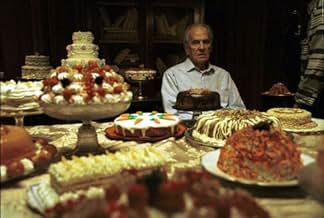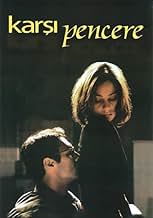
Überlastet und in einer faden Ehe gefangen, beginnt Giovanna, sich um den jüdischen Holocaust-Überlebenden zu kümmern, den ihr Mann mit nach Hause genommen hat. Sie fängt an, über ihr Leben ... Alles lesenÜberlastet und in einer faden Ehe gefangen, beginnt Giovanna, sich um den jüdischen Holocaust-Überlebenden zu kümmern, den ihr Mann mit nach Hause genommen hat. Sie fängt an, über ihr Leben nachzudenken, und fühlt sich immer mehr zu dem Mann hingezogen, der ihr gegenüber wohnt ..... Alles lesenÜberlastet und in einer faden Ehe gefangen, beginnt Giovanna, sich um den jüdischen Holocaust-Überlebenden zu kümmern, den ihr Mann mit nach Hause genommen hat. Sie fängt an, über ihr Leben nachzudenken, und fühlt sich immer mehr zu dem Mann hingezogen, der ihr gegenüber wohnt ...
- Regie
- Drehbuch
- Hauptbesetzung
- Auszeichnungen
- 34 Gewinne & 24 Nominierungen insgesamt
- Tintora
- (as Veronica Bruni)
- Alessio
- (as Ohame Brancy Chibuzo)
Empfohlene Bewertungen
Giovanna Mezzogiorno (also in "Don't Tell" aka Beast of the Heart) plays Giovanna the central 'heroine' - a young woman with plenty of mixed emotions, who is discontented with her (chicken factory accountant) job, mother to two children, wife to a husband who's night shift job schedule frustrates her, and most of time she shouts at him and wouldn't want to listen - yes, she's quite bitchy about herself, though finds brief solace when doing bit of occasional baking. Through the course of meeting the unexpected stranger that Massimo Girotti portrayed - Simone/Davide the old man at a lost, who seems to have amnesiac problem and was temporarily taken in by Giovanna's husband into their home against her wishes, yet her whole world starts to change. Writer-director Ferzan Ozpetek has a way of telling his stories, always full of humanity, foibles and virtues mixed together, turning out a thoughtful film never short of gentleness and the sharing of human kindness.
There are side events, of course: the young man whom she now and then noticed across her kitchen window in the next building, the flashbacks and 'Déjà Vu' storyline that the old man Simone experiences, the delightful turn of events - those attractive delicious-looking display of cakes and cakes - what a baker's dream!
Filmmaker Ozpetek, who was born in Turkey and lived in Italy, includes poetry in his films: he introduced Turkish poet Nâz1m Hikmet through his characters in "His Secret Life." Here, we get to hear Giovanna thinking aloud, talking to Davide: " I feel your gestures in mine, and I recognize you when you speak. Does everyone who leaves you - always leave part of themselves with you? Is this the secret of having memories?"
The cast is just wonderful, of course, Mezzogiorno and Girotti were fascinating to watch. The music by Andrea Guerra complemented the cinematography by Gianfilippo Corticelli. If you'd like more of Ozpetek's work, try "Hamam: A Turkish Bath" 1998 (my first IMDb review posted on 10 January 1999) and "His Secret Life" aka The Ignorant Fairies, 2001.
Life is full of chance meetings...often ignored...but in this film it is pivotal. A young couple, having serious relational problems, come upon a dazed old man on the street. His entrance in their lives, his own dramatic life and the wife's (Giovanna's) ultimate connection to him serves as a link to her profound choices...First, to risk a sexual encounter with the handsome neighbor she's watched through her facing windows and second, to recognize that her discontent has been with herself, more than her loving husband. The complexity of the old man's life...his survival of a concentration camp...giving up a beloved lover to save others...his success as a famous pastry chef...all contribute in a tangential way to Giovanna's transformation. The final scene is enormously moving and meaningful.
Don't miss this gem...if humanism, great performances and cinematic richness are important to you.
Italian star Giovanna Mezzogiorno is superb as the wife who seems to be locked in a constant struggle with her husband and attracted to the man in the apartment facing theirs. But Facing Window proves to be far more than melodrama triangle: echoes of the Nazi holocaust and the inner strength to realize one's true feelings, as well as one's true calling ... 'it isn't enough to dream about a better life, you must demand it.' For those who like something more substantial to their cinema than popcorn and nachos, Facing Window fits the bill with effortless grace.
Ozpetek's strength is his ability to portray characters that are realistic without being obvious, so everyone can relate to them without identifying with them. He showed that already good ability in "Le fate ignoranti" as well, but this time he seems to have developed it even further. His approach is always personal, and this enables him to make films that are deeply introspective. It is the kind of films that the French are usually good at making, but Ozpetek in not an imitator. What makes his films so DIFFERENT is that there seems an emotional involvement that is very difficult to find elsewhere; at the same time, this never translates into trite sentimentalism or dull rhetoric.
This is an outstanding film, and this is so also thanks to the performances given by most of the actors. Massimo Girotti, in his last appearance before his death, shows that, at about 80 years of age, he was still able to be a first-class actor (and this explains why he featured in so many films by Visconti); after this film, which is dedicated to him, we will all miss him even more than we already did. Giovanna Mezzogiorno, the daughter of a late actor herself, also gives an outstanding performance as the woman who finds herself at the crossroads and is torn between passion and the responsibilities of everyday life, between reality and desire, just like so many of us often are. Filippo Nigro, who also featured in a minor role in "Le fate ignoranti", is given a more important role in this film, and deservedly so. The only exception is Raoul Bova, and I wonder why Ozpetek seems to have a compelling need to cast "actors" who are more sort of toy boys, mostly in secondary roles (Bova in this case, Gabriel Garko in "Le fate ignoranti"), who usually have very limited acting abilities and who almost inevitably end up faring very poorly and suffering from the comparison that is inevitably drawn between their performances and those of the other actors who feature in the films; which is even more striking if we take into account the fact that Ozpetek seems to have the ability to rejuvenate actors and to make them play characters that are very different from their clichés (as an example, consider not only Massimo Girotti in this case, but also Margherita Buy in "le fate ignoranti").
Just one word for the soundtrack, which made the film even more touching and has spawned a major Italian chart hit.
The only criticism that can be made? How come that Italian directors seem to have lost the ability to say something about the society in which they live? In the past, they were able to be sardonic about it, and to intertwine the two levels, social and personal. Now the only films they seem able to make are personal-only stories, and that's a pity.
Altogether, a deeply recommended film.
The "Rear Window" eroticism is just one element that accidentally brings together tangled, stymied lives swirling around lovely, exhausted, frustrated chef, wife and mother Giovanna Mezzogiorno, where each child, man, woman, friend and neighbor has separate priorities and fantasies that annoying real life interferes with, from the practical to the political.
Each character and their ties are both delightfully and surprisingly complex and the actors are so comfortable bringing each to complete life that you think you too should be able to come out of the theater speaking Italian so naturally.
But this is a frank, gritty, contemporary, urban Italy we don't usually get to see, with multi-racial immigrants, underemployment and a Fascist past.
The sentimentalism of the live with no regrets lesson is leavened by the seriousness of the final revelations and the compromises that each character still makes.
The music selections nicely fit each character.
Wusstest du schon
- WissenswertesMassimo Girotti died on 6 January 2003 and the movie is dedicated to his memory. Before he was cast, Ferzan Özpetek had considered also Jean Rochefort and Serge Reggiani for his role.
- SoundtracksLa Finestra di fronte
Written by Andrea Guerra
Top-Auswahl
- How long is Facing Windows?Powered by Alexa
Details
- Erscheinungsdatum
- Herkunftsländer
- Offizielle Standorte
- Sprache
- Auch bekannt als
- Facing Windows
- Drehorte
- Ponte Sisto, Rom, Latium, Italien(where Giovanna and Filippo meet Simone)
- Produktionsfirmen
- Weitere beteiligte Unternehmen bei IMDbPro anzeigen
Box Office
- Bruttoertrag in den USA und Kanada
- 543.354 $
- Eröffnungswochenende in den USA und in Kanada
- 36.061 $
- 20. Juni 2004
- Weltweiter Bruttoertrag
- 15.535.312 $
- Laufzeit
- 1 Std. 46 Min.(106 min)
- Farbe
- Sound-Mix
- Seitenverhältnis
- 2.35 : 1





